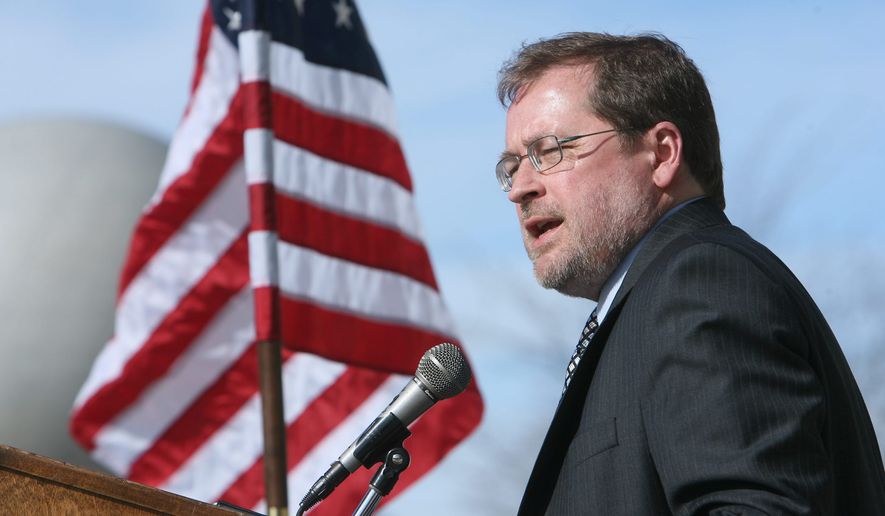Congress failed to repeal Obamacare but conservatives want to see the GOP take another swing at canceling some of the health law’s tax increases, saying it could be part of the new push to overhaul the tax code.
A tax on medical devices and a sales tax on insurance plans are slated to take effect Jan. 1, and tax-cut advocates say they’re hoping to head them off.
“We’re certainly arguing at the end of the day for abolishing all of the taxes, and certainly delaying the ones that are about to hit,” Grover Norquist, president of Americans for Tax Reform, told The Washington Times on Monday. “My sense is some of that may end up inside tax reform.”
But key Republicans on Capitol Hill are skeptical, saying that while they want to see Obamacare taxes nixed, they don’t want to mess with the health law in pieces, nor do they want to see it interfere with their tax overhaul.
“If it didn’t pass the Senate in the health care bill, why would you think it would pass the Senate in the tax reform bill?” House Ways and Means Chairman Kevin Brady said in a recent interview with Bloomberg TV.
Senate Finance Chairman Orrin G. Hatch has also called for all Obamacare taxes to go. But congressional leaders are still weighing how exactly they plan to overhaul the tax code, and some are holding out hope that lawmakers will ultimately take another shot at repealing Obamacare.
“Chairman Hatch has long supported the full repeal of Obamacare’s taxes and is currently working with his colleagues in Congress to chart a course forward on how best to protect the American people and mitigate the adverse impact of these egregious tax hikes,” said a spokesperson for the Finance Committee.
The debate is yet more fallout from the GOP’s botched Obamacare repeal.
The tax-law committees had hoped to have more budget space to do tax reform after Obamacare was canceled, and had hoped to have the health issue out of the way politically as well.
Without a repeal, they’re left eyeing a small tax reform, and still dealing with calls to mix the two issues.
Conservative advocacy organizations and industry trade groups alike are launching an August push to repeal the taxes.
AdvaMed, a trade group representing medical device manufacturers, on Monday was slated to start running an ad campaign across 15 states to push for “permanently” repealing the “jobs-killing” 2.3 percent tax placed on medical devices meant for professional use, such as mobile X-ray machines, certain types of sutures and MRI systems.
The insurance tax, which is tied to what insurers charge for premiums, was estimated to generate about $14.3 billion in 2018, but opponents say it will cause premiums to skyrocket even further as companies are forced to adjust to the new rules.
Congress had suspended both taxes from taking effect in 2016 and 2017, pushing the date to Jan. 1.
There is a “logical argument” to be made that the device tax, estimated to generate some $30 billion over 10 years, relates more to corporate tax issues than health care, AdvaMed chief advocacy officer JC Scott told The Washington Times on Monday.
“From a conceptual notion, certainly it could fit into a discussion on tax reform,” Mr. Scott said. “We would like to see this tackled wherever it’s going to get done most quickly and most fully.”
The head of a leading health insurance lobby group also wrote to Mr. Hatch recently to push for the repeal of some of Obamacare’s taxes, after the Utah Republican had requested public input on how to overhaul the tax code going forward.
“It is a fact that when a product or service is taxed, it is more expensive for consumers to purchase. Taxing health insurance is no different,” Marilyn B. Tavenner, president and CEO of America’s Health Insurance Plans, said in the letter to Mr. Hatch.
Mr. Norquist, meanwhile, helped lead a recent letter from three dozen conservative groups urging Speaker Paul D. Ryan and Senate Majority Leader Mitch McConnell to at least delay the medical device and insurance taxes from taking effect early next year.
“It’s best done in a holistic fashion,” said Pete Sepp, president of the National Taxpayers Union, who also signed the letter. “If it’s going to be piecemeal, then it’s something we’re going to have to live with.”
• David Sherfinski can be reached at dsherfinski@washingtontimes.com.




Please read our comment policy before commenting.